U.S., European negotiators cave to China on coal emissions, disappointing climate change activists
Glasgow Climate Pact abandons international call for phase-out of coal, settles instead for redoubled "phase-down."
Prince Charles, speaking at the opening of the COP26 Glasgow conference, called it "the last chance saloon for the planet."
The EU's vice-president, Franz Timmermans, was more specific. "Before we leave this conference," he said, "we need to make sure that we take decisions that put us on track to meeting our [1.5 degrees Celsius] goal, and this needs to be done within a year, because time is running out."
But after 13 days of haggling, the international gathering ended up disappointing climate change activists, as U.S. and European negotiators ultimately failed to overcome resistance from China and India to a global call to phase out coal, leaving the conference to settle instead for a more tepid "phase-down."
The event in Glasgow was presided over by U.K. government minister Alok Sharma. He appeared tearful as he summed up what little had been achieved there. "We can now say with credibility that we have kept 1.5C alive," he said. "But its pulse is weak, and it will only survive if we keep our promises and translate commitments into rapid action."
A 1.5 degrees Celsius rise in global temperatures above preindustrial levels was the key safety threshold set out in the 2015 Paris Agreement. Six years later, governments are still arguing over phasing out coal, cutting greenhouse gas emissions and providing financial assistance to the poorer nations allegedly most affected by anthropogenic climate change.
Richer nations are reluctant to use the term "compensation" for this in case it becomes an unlimited blank check. Instead, they help countries invest in green technology and other emission-cutting efforts. These are not insignificant sums, with $100 billion a year already being invested in clean energy for poorer nations and a further $20 billion a year — which is expected to double by 2025 – to mitigate the impacts of extreme weather.
But this comes nowhere near the expectations of the G77+China group of developing nations that in all represent 130 nations and 85% of the world's population. They wanted a "loss and damage facility" to be established by COP26, as a formal delivery body for funding.
Despite now being the second largest superpower in the world, China is still considered by the UN to be a developing nation due to its uneven distribution of wealth, significant air pollution and dependence on increasing energy use to fuel its future economic growth.
The latter point was the very reason Donald Trump pulled America out of the Paris Agreement in 2017 — an act for which Joe Biden felt he needed to apologize to the delegates in Glasgow.
But what is acceptable practice for a developing nation is no longer acceptable for developed nations, as China's foreign ministry spokesperson, Zhao Lijian, explained: "We encourage developed countries to take the lead in stopping using coal while providing ample funding, technological and capacity-building support for developing countries' energy transition."
It is because China is categorized as a developing nation that the U.K. still gives it foreign aid, which was estimated in 2019 to be nearly $110 million, despite having to borrow much more from China to fund its own net-zero carbon obligations.
The Chinese state and its subsidiaries have lent other nations about $1.5 trillion, making China the world's largest official creditor — surpassing the World Bank, the IMF, or all OECD creditor governments combined. And yet under the Paris Agreement it was granted exemption from reducing its coal capacity until 2030, whereas developed nations were forced to begin that process in 2016.
China has been taking full advantage of its 14-year deferral from international sanctions. It currently has 1,058 coal plants and has many new plants under construction capable of producing a further 97.8 gigawatts, with others in the planning stage adding 151.8 gigawatts, totalling almost 250 gigawatts. This is more than the United States' current coal power capacity of 234 gigawatts, which is dropping fast. The EU's capacity in 2020 was 143 gigawatts and is set to fall to 60 gigawatts by 2030.
Fatih Birol, executive director of the International Energy Agency, told the Guardian newspaper that to stay within the 1.5C limit more than 40% of the world's existing 8,500 coal plants would have to close by 2030, and that no new ones could be built.
U.S. climate envoy John Kerry believed he had bagged a deal with China during the conference to help achieve that goal, when the world's two biggest CO2 emitters pledged in a joint declaration to "recall their firm commitment to work together." Kerry's hopes were soon dashed when both China and India demanded that the wording of the "Glasgow climate pact" be changed from "phasing out" coal to "phasing down" coal.
China, the world's top emitter of methane, also refused to sign on to the Global Methane Pledge, a multilateral commitment to cut emissions of the harmful greenhouse gas 30% by 2030. China instead offered only to develop its own "national plan." India and Russia, the second- and third-highest methane emitters, respectively, also declined to sign the pledge.
Without the cooperation of China, which produces 30% of world CO2 emissions — twice the amount of America — no speech in Glasgow was going to save the 1.5C temperature-rise goal set by climate change scientists.
Mary Robinson, former U.N. commissioner for human rights, claimed that Glasgow had at least bought the world more time. "Leaders have extended by a year this window of opportunity to avert the worst of the climate crisis," she said. "The world urgently needs them to step up more decisively next year."















